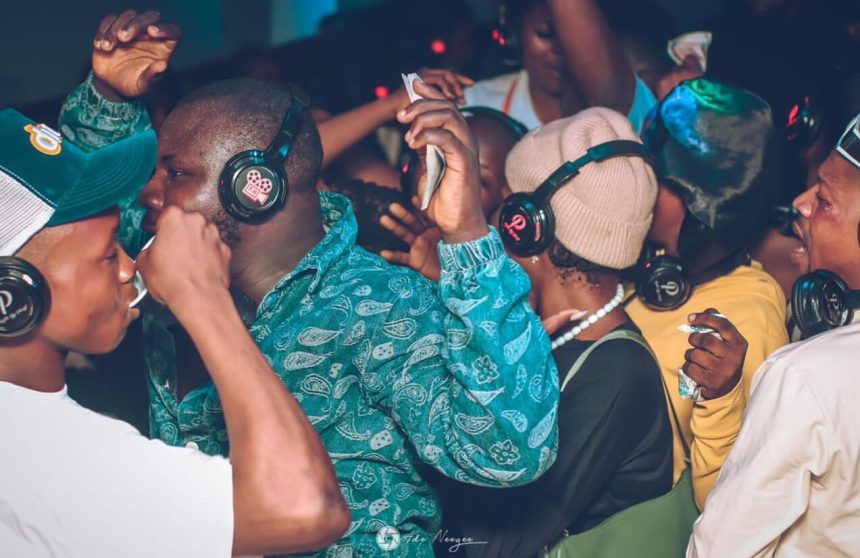ABEOKUTA, OGUN: Awodi Anthony prides himself as the first to ever host a silent disco in Nigeria. Not that the disc jockey or DJ, popularly called FlexzyRu, cared much about this kind of party’s health and environmental benefits when he started; he was just trying out what he felt was trending in other parts of the world.
A headset party, quiet club, silent disco, or silent rave is a party in which participants dance to music playing from their worn headphones. A DJ broadcasts the music from a radio transmitter that sends signals to participants’ wireless headphones, meaning the music does not blare from heavy speaker systems to disturb the neighbourhood, as those without headphones do not hear any sound.
With the headset, a participant can increase the volume of the music or reduce it to avoid damage to their ears without affecting other participants’ volume preferences.
Sound is measured in decibels, and 85 decibels is the safe level. Most speaker system-amplified concerts produce sound levels above 100 decibels, according to the Manchester Centre for Audiology and Deafness, which also said exposure to such high levels for more than 15 minutes in an eight-hour time without protection can lead to hearing impairment.
A high and extended exposure can also affect a person’s stress hormone and nervous system, leading to health problems like heart disease and depression.
One study titled “Evaluation of Noise-induced Hearing Loss in Young People Using Web-based Survey Technique” and published in the American Journal of Pediatrics, says 61% of concert attendees and clubbers without protection experience hearing impairment. And the World Health organisation says 1.1 billion young adults are at risk of permanent hearing damage due to unsafe listening habits, and 2.5 billion people are expected to develop hearing loss by 2050.
Not only are silent parties environment-friendly, but they are also safer for clubbers, given the volume control mechanism on participants’ headphones.
Adoption in Nigeria
The concept of silent discos is traced to Cisco Sa, a Portuguese who started dancing to music playing from his walkman on the streets in the early 1990s, and European environmental activists who, about the same time, partied outdoors with their headphones to avoid causing noise pollution to wildlife.
Since then, silent parties have been adopted in different parts of the world, especially in the United States, the UK, France, Italy, Germany, and Canada. In most Western countries, adoption has been propelled mainly by noise-restricting laws.
The experience is, however, new in Africa. For example, the first silent party in Rwanda was in 2017 and in Uganda, it was in 2017. In 2015, FlexzyRu, the Nigerian disc jockey, learned about silent discos on Tokyo Music, an international music event organiser and decided to try it out to give his clubbers a new feel of entertainment.
Since then, he has hosted about 45 headset parties in Lagos. More clubhouses and DJs in Abuja, Lagos, Ogun, Port Harcourt, and other Nigerian states are increasingly adopting it.
“[We use] headsets with bluetooth that can easily connect to the DJ’s laptop. The headset [can] allow [a] maximum of three DJs to play at once. The club attendees can switch to any DJ of their choice while they (DJs) play together. Each DJ is given a channel in connection to the headset,” said Damilare Rasheed (commonly called DeeBaba), who hosts silent parties in Abeokuta in Ogun State.
In Nigeria, most times, the reason for adoption is to control noise pollution. In 2017, for example, after some hoteliers and residents in Abuja petitioned the Abuja Environmental Protection Board over high noise levels from nightclubs, several clubhouses and concert organisers took to silent parties.
Some clubbers told Prime Progress that they love it because of the volume control silent raves give them and the fact that a headphone party can be held anytime and anywhere without causing noise pollution.
“It is a good thing [because] you are not disturbing others; it’s just you enjoying your music. You even have the power to increase or reduce the volume and change music on your headset,” said Tunji Disu, who attends silent parties regularly in Lagos.
“You cannot tell the DJ to change the song or reduce the volume if you are not the one that organised the party. Even those living around the clubhouse will not know something is going on; you know there are estates around.”
However, because of weak implementation of the National Environmental (Noise Standards and Control) Regulations of 2009 that limit noise levels to 55 decibels during the day and 45 decibels at night, most club houses and concert organisers still host loudspeaker-amplified parties, citing participants’ preferences.
“As an event organiser, I still prefer both. But it depends on the location and the request of the party attendees,” said Deebaba.
Like Deebaba, Ayo Idan, a DJ in Surulere, Lagos, organises both. He said he is not planning to stop loudspeaker concerts because he believes they have advantages too.
“It (silent rave) can be an advantage if you like hearing pin drop silence but a disadvantage if you find it mundane to see people dancing to a song you cannot hear,” he said.
Not entirely safe
But are silent discos entirely safe? Some medical experts do not think so.
“Consistent use of the headset may pose long-term hearing loss or altered hearing ability,” said Maxwell Idoho, an otologist in Uyo, Akwa Ibom State. He said this is because, given the frenzy in some clubs and concerts, participants are likelier to keep the music volume in their headsets higher and longer than safe limits.
Also, while silent discos are generally said to be more health and environment-friendly, some clubbers avoid them because of the cost involved. For example, some clubhouses charge clubbers as much as N5000 for each headset, an extra cost that does not apply to loudspeaker system-amplified parties.
To avoid losing customers, even clubhouses that initially embraced silent parties are finding ways to host loudspeaker-enabled discos, while those that never bought the idea of silent discos are reluctant to adopt them for the same reason.
This story was produced with the support of Nigeria Health Watch through the Solutions Journalism Network, a nonprofit organisation dedicated to rigorous and compelling reporting about responses to social problems.





